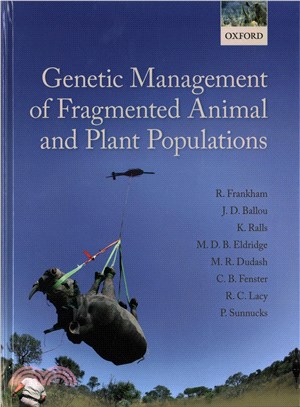定價
:NT$ 6890 元若需訂購本書,請電洽客服 02-25006600[分機130、131]。
相關商品
商品簡介
作者簡介
商品簡介
One of the greatest unmet challenges in conservation biology is the genetic management of fragmented populations of threatened animal and plant species. More than a million small, isolated, population fragments of threatened species are likely suffering inbreeding depression and loss of evolutionary potential, resulting in elevated extinction risks. Although these effects can often be reversed by re-establishing gene flow between population fragments, managers very rarely do this. On the contrary, genetic methods are used mainly to document genetic differentiation among populations, with most studies concluding that genetically differentiated populations should be managed separately, thereby isolating them yet further and dooming many to eventual extinction! Many small population fragments are going extinct principally for genetic reasons. Although the rapidly advancing field of molecular genetics is continually providing new tools to measure the extent of population fragmentation and its genetic consequences, adequate guidance on how to use these data for effective conservation is still lacking.
This accessible, authoritative text is aimed at senior undergraduate and graduate students interested in conservation biology, conservation genetics, and wildlife management. It will also be of particular relevance to conservation practitioners and natural resource managers, as well as a broader academic audience of conservation biologists and evolutionary ecologists.
This accessible, authoritative text is aimed at senior undergraduate and graduate students interested in conservation biology, conservation genetics, and wildlife management. It will also be of particular relevance to conservation practitioners and natural resource managers, as well as a broader academic audience of conservation biologists and evolutionary ecologists.
作者簡介
Richard Frankham, Emeritus Professor, Department of Biological Sciences, Macquarie University, Australia,Jonathan D. Ballou, Scientist Emeritus, Smithsonian Conservation Biology Institute, Smithsonian Institution,Katherine Ralls, Emeritus Research Zoologist, Smithsonian Conservation Biology Institute, Smithsonian Institution,Mark Eldridge, Principle Research Scientist, Terrestrial Vertebrates, Australian Museum,Michele R. Dudash, Professor and Head of the Department of Natural Resource Management, South Dakota State University,Charles B. Fenster, Professor, Department of Biology and Microbiology, South Dakota Agricultural Experiment Station,Robert C. Lacy, Senior Conservation Scientist, Chicago Zoological Society,Paul Sunnucks, Professor, School of Biological Sciences, Monash University
Emeritus Professor Richard Frankham is one of the leading international figures in conservation genetics, having been a pioneering researcher in the discipline and senior author on the first textbooks in the field. In 2005 he was awarded a DSc by Macquarie University (Sydney, Australia), based upon his published work (now > 160 publications). Throughout his career he has worked on the genetic impacts of small population sizes in the contexts of conservation and evolutionary genetics and animal breeding. His background is in agriculture (BScAgr [Hons 1] and PhD from the University of Sydney, Australia). He worked for Agriculture Canada (1967-69), followed by a postdoctoral fellowship at the University of Chicago (1969-71), before spending 31 years at Macquarie University. He officially retired in 2002, but continues to work full-time. In 2004, he was Hrdy Visiting Professor in conservation biology at Harvard University, USA.
Jonathan Ballou is a Research Scientist Emeritus at the Smithsonian Institution's Smithsonian Conservation Biology Institute in Washington, DC and from 2003-2006 was Head of its Department of Conservation Biology. His research has focused on the genetic and demographic problems confronted by small populations, especially of threatened
species. He is recognized as a leader in developing the theoretical basis for the genetic management of small populations and in developing population management tools (software, applied theory) that are widely
and internationally used by wildlife and zoo managers. Jon received his bachelor's degree in Animal Behavior from the University of Virginia in 1977, his masters in statistics at George Washington University in 1985 and his PhD in Population Genetics from the University of Maryland in 1995.
Katherine Ralls is interested in the behavioral ecology and conservation genetics of mammals. She studied biology at Stanford and received her PhD from Harvard. An Emeritus Research Zoologist with the Smithsonian's Conservation Biology Institute, she worked at the Smithsonian's National Zoo from 1976 until her retirement in 2014. Her work with co-author Jonathon Ballou on inbreeding problems in captive mammals led to her interest in conservation. In addition to her work on the genetics of small populations, she helped found the Society for Conservation Biology, studies endangered foxes and sea otters, and has served on recovery teams for several endangered species.
Mark Eldridge studied genetics and zoology for a BSc (Hons) at Macquarie University and then received a PhD from Macquarie University in 1992. He was awarded an Australian Postdoctoral Research fellowship in 1992 and a QEII Fellowship in 1999. He was appointed as a Research Scientist at the Australian Museum in 2007 and has continued to use molecular techniques to study marsupial evolution, taxonomy and conservation biology.
Michele Dudash is a population biologist by training, thus her research focuses on both the ecological and genetic factors responsible for a population's persistence or demise in nature. In this context the major theme of her research has been on the ecology and evolution of reproductive systems in nature. Topics she has investigated with colleagues and students include plant mating system evolution, plant-pollinator interactions, demography of populations, and the role inbreeding, inbreeding depression, and phenotypic plasticity play in the evolution of plant populations. Her research program also directly applies to the need for baseline data that may be utilized to help form successful conservation and restoration management plans for threatened taxa. In addition to her prior academic appointments Michele has served at the National Science Foundation and is currently in an administrative Head post.
Born in Queens, NYC, Charles Fenster developed an early interest in population dynamics and genetics that was piqued by observations in Flushing Meadows, and fostered by mentors and peers at Stuyvesant High School and the Jackson Laboratory (notably Robert Collins). While at Amherst College he was inspired to redirect his interests in genetics to evolution by Douglas Schemske who later became his PhD mentor at the University of Chicago. Douglas Schemske and later postdoc mentors at the University of Toronto, Spencer Barrett and Kermit Ritland, encouraged genetic studies in a natural context as an effective way to understand the genetics underlying evolutionary process. These research goals also naturally led to an interest in the conservation of biodiversity, which this book represents. His current work focuses on the origin of genetic diversity through the study of mutations, as well as investigations on the relationship between angiosperm structure and function as a model for natural selection.
Robert C. Lacy is a Senior Conservation Scientist for the Chicago Zoological Society, and is on the faculty of the Committee on Evolutionary Biology at University of Chicago. He has served as Chair of the IUCN Conservation Breeding Specialist Group (2003-2011), and was Chair of an IUCN Species Conservation Planning Task Force that developed a framework for strategic planning for species conservation. Together with Jonathan Ballou, he helped to develop the pedigree analysis methods used for the management of captive populations in zoos. Similarly, his population viability analysis software (Vortex) is used by conservationists, wildlife managers, researchers, and students throughout the world to help guide species risk assessments and conservation planning.
Paul Sunnucks studied Zoology at Oxford University, and then completed a PhD in population biology at University College London. During three years in one the world's first conservation genetics groups at the Institute of Zoology London, Paul married Australian Andrea Taylor and subsequently migrated to Australia. Following research positions in Sydney, and embarking on parenting, he moved to Melbourne. Since 2005 at Monash University, he has headed the Persistence and Adaptation Research Team. Paul's research applies ecological genomics to conservation-relevant population biology. He has a particular liking for all lifeforms, and working with smart, fun people.
主題書展
更多
主題書展
更多書展本週66折
您曾經瀏覽過的商品
購物須知
外文書商品之書封,為出版社提供之樣本。實際出貨商品,以出版社所提供之現有版本為主。部份書籍,因出版社供應狀況特殊,匯率將依實際狀況做調整。
無庫存之商品,在您完成訂單程序之後,將以空運的方式為你下單調貨。為了縮短等待的時間,建議您將外文書與其他商品分開下單,以獲得最快的取貨速度,平均調貨時間為1~2個月。
為了保護您的權益,「三民網路書店」提供會員七日商品鑑賞期(收到商品為起始日)。
若要辦理退貨,請在商品鑑賞期內寄回,且商品必須是全新狀態與完整包裝(商品、附件、發票、隨貨贈品等)否則恕不接受退貨。























